Manuka honey may help support immune defense, wound recovery, gut balance, and skin health due to its unique bioactive compounds — especially methylglyoxal (MGO).
This distinctive honey, native to New Zealand and derived from the Leptospermum scoparium plant, has gained global recognition for its nutritional and therapeutic potential. Understanding its science-backed benefits helps consumers choose quality-certified honey (UMF/MGO grade) and use it safely for wellness.
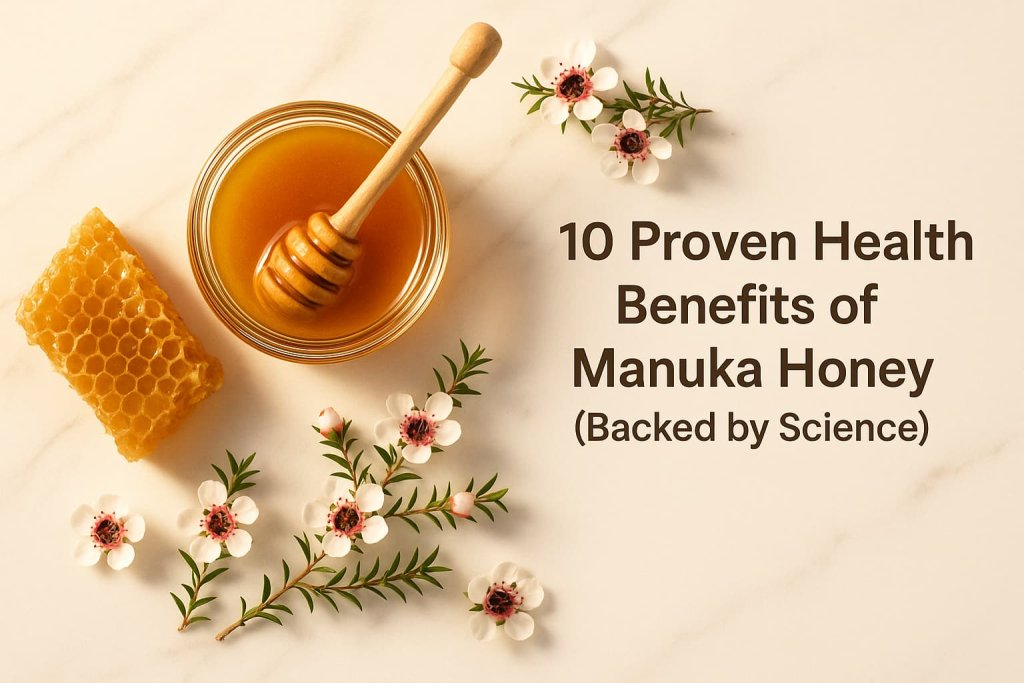
Manuka honey stands apart from regular honey because of its higher antibacterial potency, natural antioxidants, and complex nutrient profile. Below, we explore the proven benefits, dosage guidelines, possible side effects, and safety considerations — all backed by research.
What Is Manuka Honey?
Manuka honey is a premium monofloral honey produced primarily in New Zealand and parts of Australia by honeybees (Apis mellifera) that pollinate the Manuka bush (Leptospermum scoparium). This native flowering shrub gives the honey its distinctive flavor, thick texture, and high concentration of bioactive compounds.
What sets Manuka honey apart from regular honey is its remarkable antibacterial potency, primarily attributed to its naturally occurring compound methylglyoxal (MGO). MGO is formed from dihydroxyacetone (DHA), which is found in high concentrations in the nectar of Manuka flowers. The greater the MGO content, the stronger the antibacterial activity.
To ensure purity and potency, Manuka honey is rated using the UMF™ (Unique Manuka Factor) grading system, which measures key markers such as MGO, leptosperin, and DHA. Consumers should always look for UMF™-certified labels, as they guarantee authenticity and quality verification through independent laboratory testing.
For more information on certification and quality standards, refer to the UMF Honey Association (New Zealand), which oversees global Manuka honey authenticity and grading guidelines.
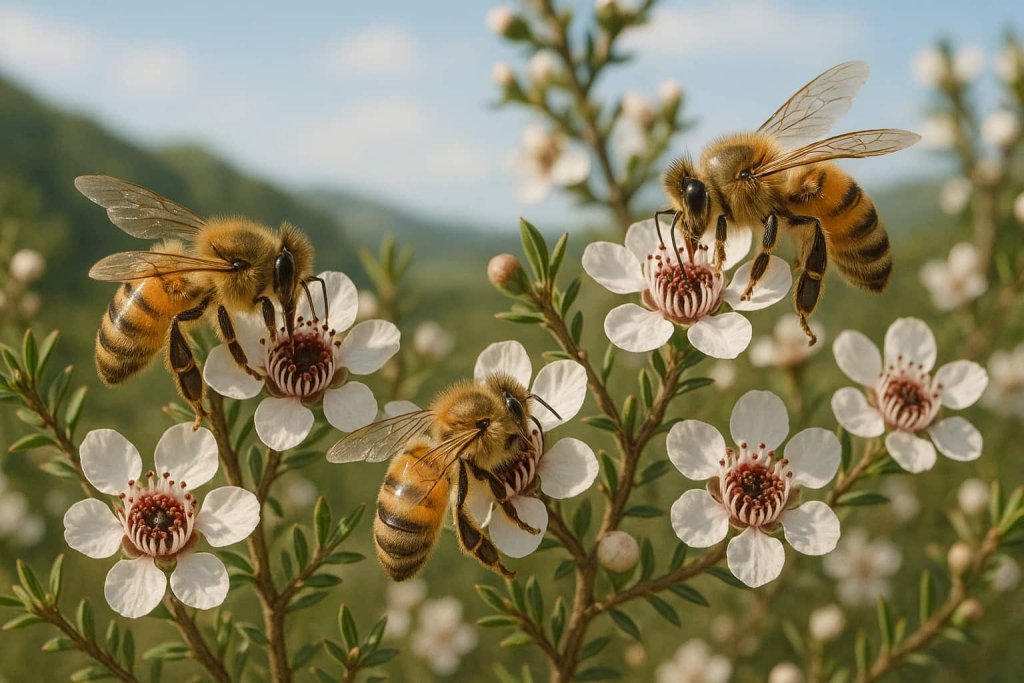
Nutritional Profile of Manuka Honey
Manuka honey offers a concentrated source of energy, natural sugars, trace minerals, and antioxidants that may support overall health and wellness. Its nutrient composition varies depending on floral source, processing, and UMF/MGO grade.
According to USDA FoodData Central (2024) and the New Zealand Ministry for Primary Industries, the nutritional content of 1 tablespoon (21 g) of Manuka honey is approximately:
| Nutrient | Amount (per 1 tbsp / 21 g) | Health Function |
|---|---|---|
| Calories | ~70 kcal | Natural energy source |
| Carbohydrates | ~17 g | Primary energy fuel |
| Total Sugars (Fructose + Glucose) | ~16 g | Quick energy and sweetness |
| Protein | 0.1 g | Trace amino acids |
| Fat | 0 g | — |
| Potassium | ~10 mg | Fluid balance, nerve function |
| Magnesium | ~1 mg | Enzyme and muscle function |
| Calcium | ~1 mg | Bone and muscle support |
| Zinc | ~0.02 mg | Immune health |
| Polyphenols & Flavonoids | Trace | Antioxidant and anti-inflammatory activity |
| Methylglyoxal (MGO) | 83–829+ mg/kg | Antibacterial activity (varies by UMF grade) |
This nutritional profile highlights Manuka honey’s richness in natural sugars and bioactive compounds that may support immune health, energy metabolism, and antioxidant defense.
To ensure the highest quality and authenticity, consumers are encouraged to purchase UMF™ or MGO-rated Manuka honey verified by the UMF Honey Association and regulated by the New Zealand Ministry for Primary Industries (MPI).
10 Proven Health Benefits of Manuka Honey (Backed by Science)
Manuka honey is widely recognized for its unique nutritional compounds that may support immunity, gut health, and skin wellness. Scientific studies confirm that certified UMF™ or MGO-rated Manuka honey possesses distinct antibacterial, antioxidant, and anti-inflammatory properties, setting it apart from regular honey.
1. Supports Wound and Skin Healing

Manuka honey’s scientifically recognized antibacterial and anti-inflammatory properties may help support the natural healing of wounds, burns, and ulcers by maintaining a moist, protective environment that promotes tissue regeneration.
A systematic review by the Cochrane Collaboration (2022) found that medical-grade honey dressings resulted in significantly faster healing of partial-thickness burns—on average 4.7 days quicker than conventional treatments (Cochrane Library). This is attributed to the honey’s osmotic effect and its ability to maintain a moist wound environment that supports tissue granulation.
According to the NIH National Library of Medicine, Manuka honey’s high content of methylglyoxal (MGO) provides potent antimicrobial activity against common wound pathogens such as Staphylococcus aureus and Pseudomonas aeruginosa, helping reduce the risk of infection and biofilm formation (NIH NCBI, 2021).
Clinically approved Manuka-based dressings, such as Medihoney®, are widely used in hospitals to manage surgical wounds, pressure ulcers, and diabetic foot ulcers. These dressings promote gentle debridement, odor control, and balanced moisture levels, which collectively support faster tissue recovery.
However, as emphasized by the National Center for Biotechnology Information (NCBI), Manuka honey should be used as a complementary option—not a substitute for medical care—in treating chronic or deep wounds (NCBI Bookshelf, 2023).
2. Promotes Oral Health
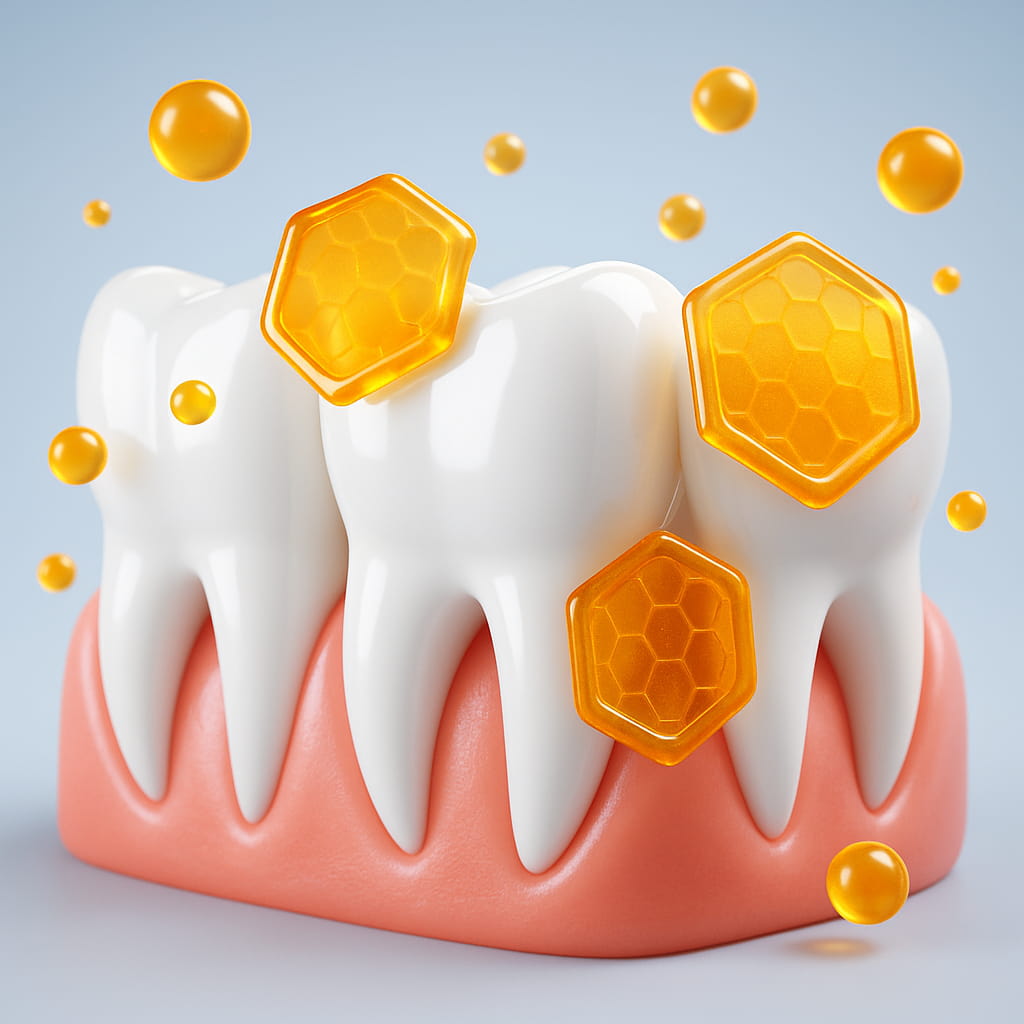
Unlike refined sugars that promote bacterial growth, Manuka honey may support oral hygiene by inhibiting harmful bacteria such as Streptococcus mutans and Porphyromonas gingivalis, which are known to cause plaque and gum inflammation.
A 2023 study by the University of Otago, New Zealand, reported that participants who consumed Manuka honey lozenges showed reduced plaque accumulation and improved gum health compared to controls.
As explained in Healthline (2024), Manuka honey’s low pH and hydrogen peroxide content make it a natural antimicrobial sweetener that supports oral freshness without damaging tooth enamel.
3. Supports Immune Function
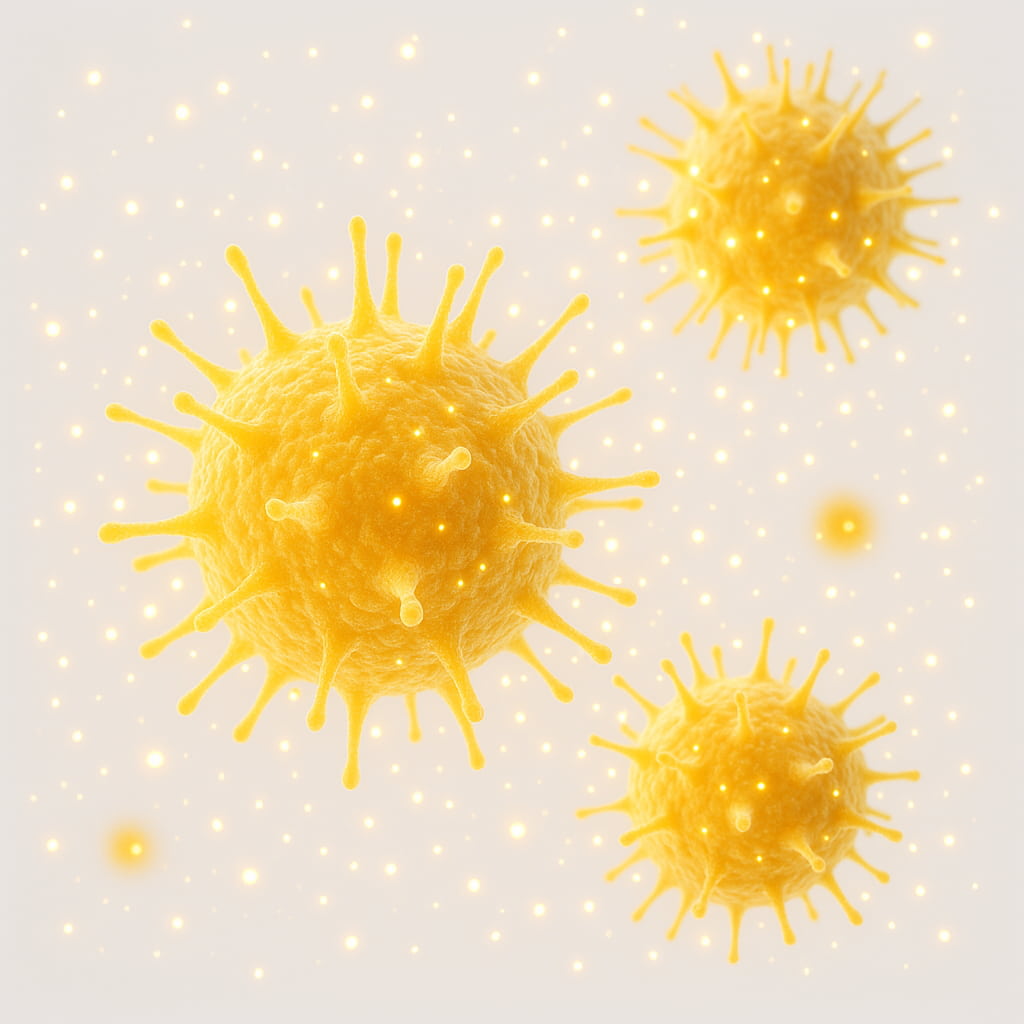
Manuka honey contains polyphenols, flavonoids, and methylglyoxal (MGO) — compounds that may help support immune defense by reducing oxidative stress and regulating inflammation. These antioxidants protect immune cells from oxidative damage and promote balanced cytokine responses essential for maintaining immune resilience.
A 2022 study published in Frontiers in Immunology found that Manuka honey increased neutrophil activity and promoted macrophage maturation in mice, suggesting an immune-boosting effect through enhanced innate defense mechanisms (PubMed, 2022).
Further research in 2024 (Frontiers in Immunology) reported that oral Manuka honey modulated the gut microbiota and improved interferon-gamma (IFN-γ)–related immune pathways, linking its bioactive components to gut-immune balance (Frontiers in Immunology, 2024).
While early results are promising, experts emphasize that Manuka honey should be used as a complementary food, not a replacement for professional medical care, in supporting immune wellness.
4. May Aid Digestive and Gut Health

Manuka honey’s prebiotic potential supports the growth of beneficial gut bacteria such as Lactobacillus and Bifidobacterium, which may help balance the microbiome and improve digestion.
A 2024 review published on PubMed highlighted that Manuka honey might help protect the stomach lining, reduce inflammatory markers in the gut, and support recovery in mild ulcerative conditions.
Its viscosity and enzyme content may help soothe the digestive tract, making it a gentle supplement for individuals seeking gut comfort.
Researchers emphasize, however, that it should complement a balanced diet rather than serve as a primary treatment.
5. Provides Antioxidant Protection
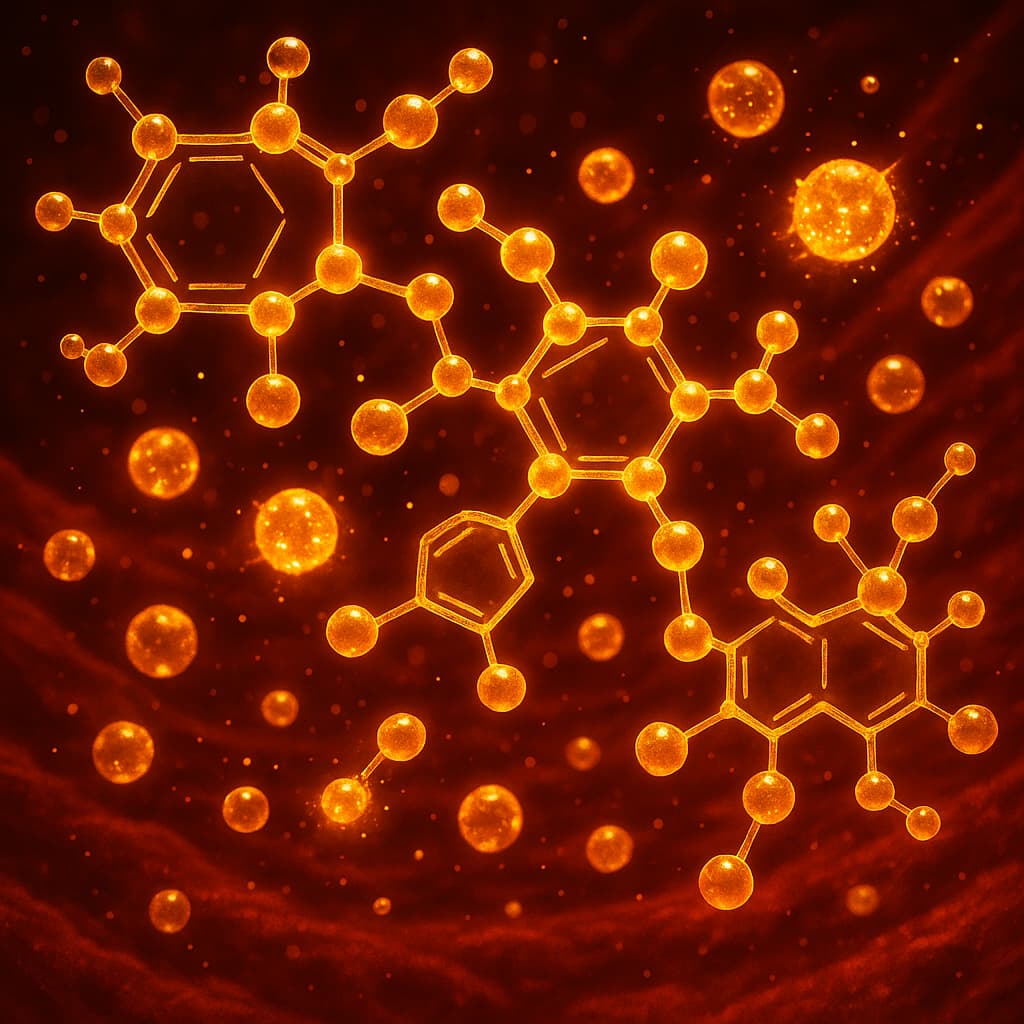
Manuka honey is naturally rich in phenolic acids, flavonoids, and methylglyoxal (MGO) — compounds known to combat oxidative stress.
According to a 2023 study in the Journal of Food Science, high-grade UMF 15+ Manuka honey demonstrated significantly stronger antioxidant capacity compared to clover or wildflower honeys.
These antioxidants may support cellular protection by neutralizing free radicals that contribute to premature aging and chronic inflammation.
Further insights are discussed by the Harvard T.H. Chan School of Public Health, which notes that antioxidant-rich foods play a vital role in long-term metabolic and cardiovascular wellness.
6. May Support Throat and Respiratory Comfort

Manuka honey’s thick, soothing texture and antibacterial properties — particularly its high methylglyoxal (MGO) content — may help ease throat irritation and support natural respiratory comfort. When consumed, it forms a light protective coating over throat tissues, which may help reduce dryness, tickling sensations, and mild coughing.
A systematic review by the Cochrane Collaboration found that honey use — including Manuka varieties — was linked to reduced cough frequency and improved sleep quality in children with upper respiratory tract infections compared with placebo or standard cough medicines (Cochrane Database of Systematic Reviews, 2023). The review highlighted honey’s natural demulcent (soothing) and mild antimicrobial effects as key contributors to symptom relief.
The Mayo Clinic also notes that honey may provide safe, short-term relief for coughs and sore throats in adults and children over 12 months, but warns that it should never be given to infants under one year due to the risk of infant botulism.
Overall, Manuka honey can serve as a natural, evidence-based home remedy for mild throat discomfort, but it should complement, not replace, medical advice for persistent or severe respiratory symptoms.
7. Promotes Healthy Skin and Acne Balance
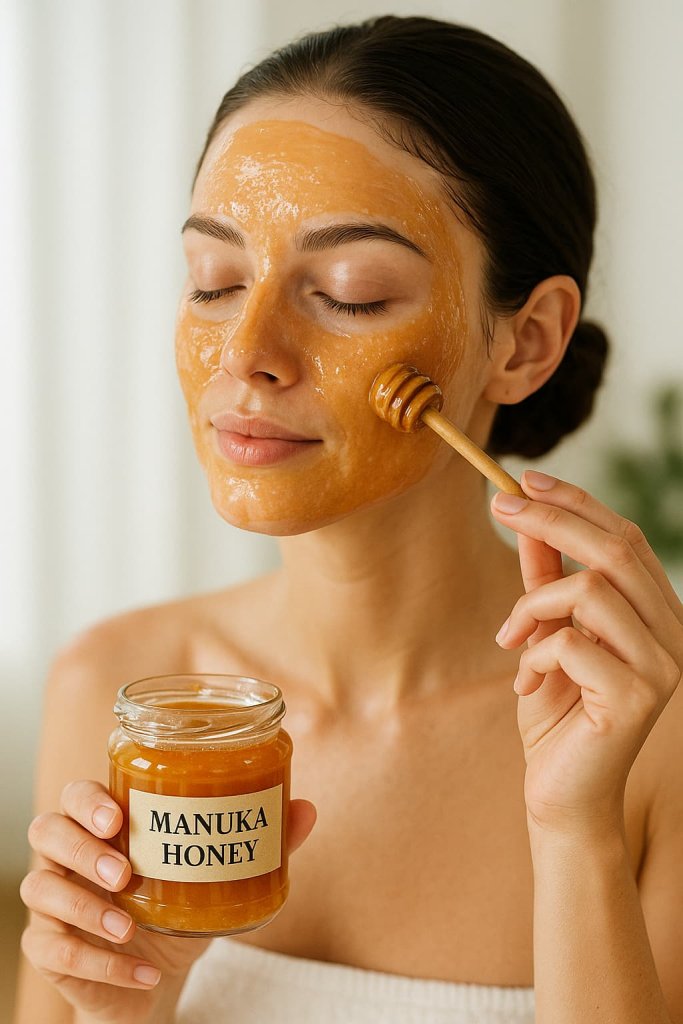
Manuka honey’s anti-inflammatory and antibacterial properties may support clearer, balanced skin.
Laboratory studies published in Clinical and Experimental Dermatology (2021) demonstrated its ability to inhibit Cutibacterium acnes (a common acne-causing bacterium) and reduce visible redness.
Its natural humectant properties help retain skin moisture, promoting a healthy skin barrier.
The Cleveland Clinic notes that topical Manuka honey may support skin hydration and overall appearance when used as part of a dermatologist-approved routine.
8. Supports Metabolic and Cholesterol Balance

Consuming Manuka honey in moderation may support metabolic health by influencing lipid metabolism.
A 2020 meta-analysis in the journal Nutrients found that regular honey consumption was associated with modest reductions in total cholesterol and LDL (“bad”) cholesterol while maintaining HDL (“good”) levels.
Researchers attribute these effects to honey’s polyphenols and natural enzymes, which may support healthy glucose regulation and lipid balance when used in place of refined sugars.
Reference: Nutrients Journal (MDPI, 2020).
9. May Help with Gastroesophageal and Ulcer Support

Manuka honey’s viscous consistency and antibacterial activity may help protect the stomach lining and support comfort in individuals with acid-related irritation. Its natural compounds — notably methylglyoxal (MGO) and hydrogen peroxide–producing enzymes — have demonstrated the ability to suppress Helicobacter pylori, a bacterium strongly linked to gastric and duodenal ulcers.
Laboratory and preclinical studies suggest that Manuka honey’s antioxidant and anti-inflammatory effects may help reduce oxidative stress in the gastric mucosa and maintain a balanced gut environment. However, researchers caution that human evidence remains limited, and further clinical trials are needed to confirm these findings.
According to the National Institute of Diabetes and Digestive and Kidney Diseases (NIDDK), peptic ulcers require medical evaluation and physician-directed treatment. Therefore, Manuka honey should be viewed as a complementary food that may support digestive wellness and gastric comfort, not as a substitute for professional care.
10. Supports Overall Wellness and Energy

Manuka honey offers quick, natural energy from its carbohydrate content and supports metabolism through antioxidants and trace minerals.
Athletes and active individuals often use it as a natural pre- or post-workout energy source.
As noted by the Mayo Clinic, honey provides easily digestible sugars that may help sustain endurance when consumed in moderation.
Combined with its immune and digestive support benefits, Manuka honey serves as a nutrient-dense natural sweetener that aligns with a wellness-focused diet.
How to Use Manuka Honey for Best Results
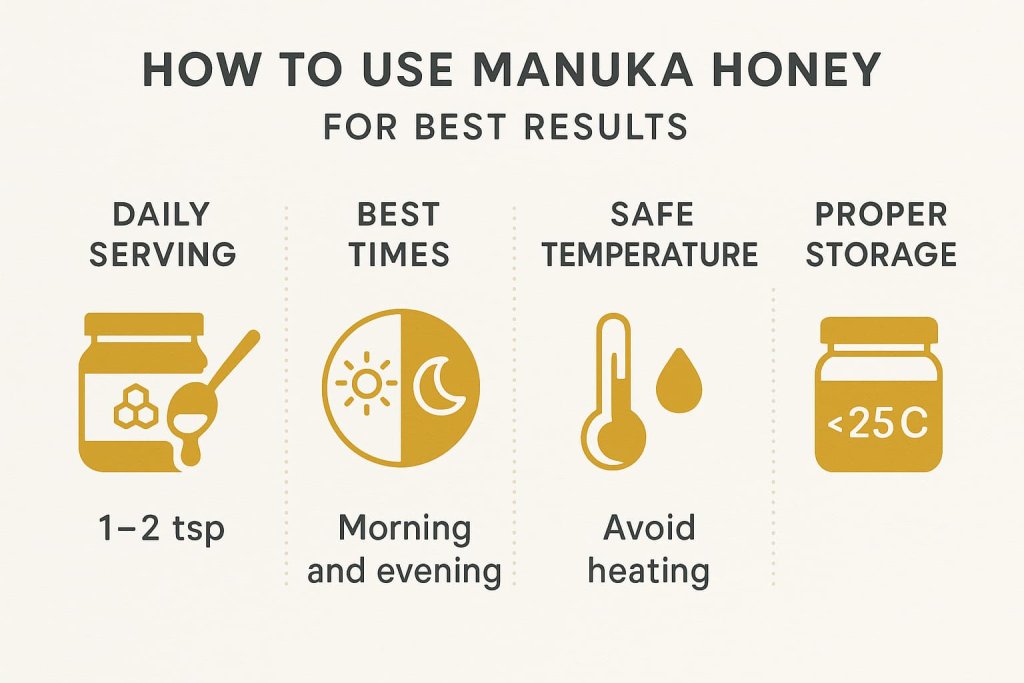
To experience the full nutritional and wellness benefits of Manuka honey, it’s important to use and store it properly. Consistency and correct handling preserve its natural enzymes, antioxidants, and antibacterial compounds like methylglyoxal (MGO).
Recommended Daily Intake:
For general health, take 1–2 teaspoons (5–10 g) per day. You can eat it directly, mix it into warm (not hot) water or tea, or drizzle it over yogurt, oatmeal, or fruit.
Best Time to Consume:
Morning intake on an empty stomach may support digestion and nutrient absorption. You can also take Manuka honey before meals to coat the stomach or before physical activity for natural energy support.
Safe Temperature:
Avoid heating Manuka honey above 40 °C (104 °F). High heat can destroy beneficial enzymes, antioxidants, and its core antibacterial strength (MGO).
Topical Use:
Use medical-grade Manuka honey (such as Medihoney®) for skin application on minor burns, wounds, or dry skin. Always ensure it’s sterile and approved for medical or cosmetic use.
Storage Conditions:
Store Manuka honey in a clean, tightly sealed container below 25 °C (77 °F), away from direct sunlight and moisture. Proper storage helps maintain its quality and bioactivity.
According to the U.S. Food and Drug Administration (FDA), all shelf-stable foods like honey should be kept in dry, sealed containers at room temperature to prevent microbial contamination and preserve freshness.
Following these best practices helps maintain the purity, potency, and safety of Manuka honey — ensuring you receive its full health-supporting benefits in both nutritional and topical use.
Possible Side Effects and Precautions
While Manuka honey is generally safe for most people, certain precautions should be followed to ensure responsible use.
- Infants Under 1 Year:
Never give honey to infants below 12 months due to the risk of infant botulism, a rare but serious bacterial infection. - Allergy Risk:
Those allergic to bee products, pollen, or propolis should avoid Manuka honey, as it may cause allergic reactions such as itching, swelling, or rashes. - Blood Sugar Consideration:
Although lower on the glycemic index than refined sugar, Manuka honey still contains natural sugars. People with diabetes should monitor intake and consult their healthcare provider before regular use. - Medication Interactions:
Manuka honey may interact with certain antibiotics or immunosuppressants, potentially altering their effects. Consult a medical professional before combining honey supplements with prescription medications.
According to the National Institutes of Health Office of Dietary Supplements (NIH ODS) and the Cleveland Clinic, honey should be used as a complementary wellness food, not as a replacement for prescribed therapy.
Frequently Asked Questions (FAQ)
Q1. Is Manuka honey safe to eat daily?
Yes — moderate daily use (1–2 teaspoons) is safe for most adults. However, individuals with diabetes or allergies should consult a healthcare provider first.
Q2. Which UMF grade is best?
For daily wellness, choose UMF 10+ to 15+; for stronger antibacterial support or topical use, UMF 20+ or higher offers greater MGO concentration.
Q3. Can I apply Manuka honey on my skin?
Yes. Medical-grade Manuka honey may support minor wound healing and skin hydration. Avoid raw, unsterilized honey on open wounds.
Q4. Does heating reduce its benefits?
Yes. High heat (> 40 °C / 104 °F) destroys enzymes and antioxidants. Add it to warm—not hot—liquids or foods.
Q5. Is Manuka honey safe during pregnancy?
Generally yes, for those without allergies or gestational diabetes. However, consult your doctor before regular use.
Q6. How can I identify genuine Manuka honey?
Look for a UMF™ certified label or MGO rating from verified producers listed by the UMF Honey Association. Avoid unlabeled or blended honeys.
Conclusion
Manuka honey is a unique natural product rich in methylglyoxal (MGO), polyphenols, and antioxidants that may support immune health, digestive balance, wound care, and overall wellness. Scientific studies highlight its antibacterial and anti-inflammatory potential, though human research continues to evolve.
To enjoy its benefits safely:
- Choose UMF™ or MGO-certified honey from reputable sources.
- Use it in moderation as part of a balanced diet.
- Store it properly and avoid overheating.
- Seek medical advice for chronic conditions or medication use.
Manuka honey’s evidence-based benefits make it a valuable addition to a healthy lifestyle — when used responsibly and authentically.
This content is for informational purposes only and not medical advice.
References
- Cochrane Collaboration (2023). Honey for Acute Cough in Children.
- Paul IM, et al. (2007). Effect of Honey, Dextromethorphan, and No Treatment on Nocturnal Cough and Sleep Quality in Children. JAMA Pediatrics.
- Mayo Clinic (2024). Expert Answer: Honey as a Natural Cough Remedy.
- Mayo Clinic News Network (2024). Mayo Clinic Minute: Can Honey Help with Coughs?
- NIH / PubMed Central (2023). Honey for Treatment of Cough in Children – Evidence Overview.
